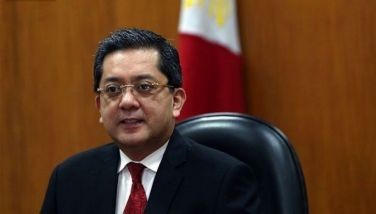42% of Pinoys oppose Charter change
MANILA, Philippines - A recent survey conducted by Pulse Asia showed that four in 10 Filipino adults or 42 percent oppose Charter change (Cha-cha).
The non-commissioned survey, conducted from Feb. 2 to 15, showed that 33 percent of respondents are in favor of amending the 1987 Constitution while 25 percent are undecided on the matter.
The survey likewise revealed that most Filipinos or 57 percent know little about the 1987 Philippine Constitution.
Pulse Asia said that between November 2006 and February 2009, the overall percentage of those against Cha-cha remains constant but there is a slight drop in the level of support for constitutional amendments (-6 percentage points), which is matched by an increase in the level of public indecision on the issue (+6 percentage points).
Pulse Asia said “big pluralities to small majorities” (42 percent to 56 percent) across geographic areas and socio-economic groupings are against constitutional amendments now.
The exceptions are in Mindanao where indecision is the predominant public sentiment (41 percent) and Class E where almost the same percentages are either against or supportive of charter change (40 percent versus 37 percent).
And while there is an increase in the percentage of Visayans against constitutional amendments (+21 percentage points), a drop is recorded in Mindanao (-16 percentage points), Pulse Asia said.
The survey also showed that almost two out of every three Filipinos or 64 percent are of the view that it is not appropriate to have Charter change at the present time – a view shared by majorities (60 percent to 70 percent) in all geographic areas and socio-economic groupings.
Across geographic areas and socio-economic classes, 27 percent to 42 percent are open to amending the 1987 Constitution in the future while 24 percent to 40 percent are against Charter change at any time, Pulse Asia said.
The Pulse Asia survey found that economic improvement is the top reason cited by those favoring Charter change while those opposed to amending the 1987 Constitution think it is good enough and would like to avoid any chaos that may arise from changing the country’s supreme law.
Another often-mentioned reason is that Charter change would help eradicate corruption in the country (20.7 percent citing at the national level and 15.1 percent to 25.2 percent citing across geographic areas and socio-economic groupings).
The reason cited by around one in ten (11.9 percent) of those favoring Charter change is that constitutional amendments would help improve the laws in the country. Bigger percentages of those in Mindanao (19.3 percent) and Class ABC (19.7 percent) cite this as their reason for supporting Charter change now. The other reasons are mentioned by less than 10 percent while 5.8 percent are unable to say what their reasons are for favoring constitutional amendments.
Meanwhile, the top reasons cited by those against Charter change are: (1) to avoid chaos in the country (16.7 percent); (2) there is no need to amend the 1987 Constitution because it is good enough (16.4 percent); (3) to prevent term extensions for government officials (11.5 percent); (4) to prevent extending the term of office of President Arroyo (10.8 percent); and (5) the belief that constitutional amendments will not change the economic conditions in the country anyway (10.7 percent).
“These reasons are mentioned by practically the same percentages across geographic areas and socio-economic groupings,” Pulse Asia said.
The survey also found out that four in five Filipinos (81 percent) are not in favor of extending the term of office of national and local elective officials, and 77 percent do not support moves to allow elective officials to run in the elections as many times as possible.
Both proposals are opposed by considerable to overwhelming majorities across geographic areas and socio-economic classes (68 percent to 92 percent), with non-support being most pronounced in Metro Manila. In contrast, these proposed changes to the 1987 Constitution have the support of 19 percent and 23 percent of Filipinos, respectively.
As for the proposal to allow foreigners to own residential and industrial lands, majorities ranging from 81 percent in the rest of Luzon and Class E to 90 percent in Metro Manila are against this proposed amendment.
Meanwhile, the latest survey showed that 59 percent of Filipinos do not agree with proposals to shift to parliamentary and federal systems of government.
Majorities at the national level (59 percent) and across geographic areas and socio-economic classes (52 percent to 63 percent) are not in favor of shifting to a parliamentary system of government. An exception is in Mindanao where this sentiment is expressed by less than a majority (47 percent), although this is still the predominant public sentiment on the matter in this geographic area.
On the other hand, almost the same percentages are either in favor of such a shift or express ambivalence on the proposal (21percent versus 20 percent).
The survey revealed that support for a parliamentary system is most pronounced in the Visayas (29 percent) but least notable in Class ABC (14 percent) while levels of indecision range from eight percent among Visayans to 31 percent among Mindanaoans.
Between March 2006 and February 2007, Pulse Asia observed a 12-percentage point drop in the level of support for a parliamentary system while the level of indecision goes up by seven percentage points.
Across geographic areas, preference for a parliamentary system becomes less pronounced in Metro Manila and the rest of Luzon (-15 to -21 percentage points).
Across all socio-economic classes, there is less preference for a parliamentary system now than in March 2006 (-11 to -17 percentage points), Pulse Asia added.
Lack of support for a shift to a federal system of government is the predominant public sentiment at the national level and in all geographic areas and socio-economic groupings (47 percent to 66 percent).
Amid the revival of talks concerning Charter change, nearly six in 10 Filipinos (57 percent) report having little knowledge about their Constitution.
Meanwhile, 25 percent of Filipinos say that they know enough about the 1987 Constitution, 16 percent admit to having almost or completely no knowledge at all, and only three percent claim to know a lot.
“For the most part, the February 2009 figures do not differ significantly from those obtained by Pulse Asia in 2003, 2005, and 2006,” it said.
Filipinos favoring the constitutional convention mode to amend the 1987 Constitution outnumber those supportive of the constituent assembly option (69 percent versus 31 percent).
Sixty-nine percent of Filipinos agree that convening a Constitutional Convention to amend the 1987 Constitution is better than convening Congress into a constituent assembly to accomplish the same task – a mode preferred by 31 percent of Filipinos.
Small to big majorities (59 percent to 74 percent) across geographic areas and socio-economic groupings favor a constitutional convention over a constituent assembly, with those in Class D (73 percent) and the rest of Luzon (74 percent) being most supportive of the constitutional convention mode. On the other hand, support for a constituent assembly is most pronounced in Class E (37 percent) and the Visayas (41 percent).
Like previous Pulse Asia surveys, this nationwide survey is based on a sample of 1,200 representative adults 18 years old and above. It has a plus or minus three percent error margin at the 95 percent confidence level.
Palace welcomes result of survey
Presidential adviser on political affairs Gabriel Claudio welcomed the results of the Pulse Asia survey on charter change as “a public reaction well taken.”
Claudio said that the country’s legislators were probably mindful and cognizant of the reaction of the public on charter change, which he said could be the reason why the efforts to amend the Constitution are not making any progress.
“If you notice, three months ago, it was already 20 votes shy. It’s not moving forward,” Claudio said.
Claudio said that he has met with the leaders of the House including House Speaker Prospero Nograles, Majority Leader Art Defensor and the President’s son and Pampanga Rep. Juan Miguel “Mikey” Arroyo and all of the discussions have been on the preparations for the 2010 elections.
Senate to raise Cha-cha to SC
Senate President Juan Ponce Enrile said the Senate would bring the Charter change issue before the Supreme Court if the House will push through with it without the Senate’s participation.
“We’ll have to take it to the SC if they will disregard the Senate and treat the Senate as a matter of numbers,” Enrile said.
“You have to remember that we are a bicameral Congress. The Congress of the Philippines is composed of two houses, the Senate and the House. One without the other is not the Congress of the Philippines. Isn’t that clear?” Enrile told reporters yesterday.
“I understand that the proposal of Speaker Nograles is to amend the economic provisions. I don’t think they are going to touch on the political provisions of the Constitution, especially the structure of government. But even the economic provision at this time will be difficult to pass. You’ll require a lot of studies, a lot of discussions, a lot of debates on the issues that will come by,” Enrile explained.
Administration congressmen claimed yesterday that President Arroyo has nothing to do with their efforts to amend the Constitution.
Deputy Speaker Simeon Datumanong said the effort by allies of the President in the House to propose constitutional amendments is their own initiative.
“The House is mandated to act and decide on any Charter change proposal. The Palace has nothing to do with our action or decision on any Cha-cha proposal,” he said.
Several House members have pointed to Mikey Arroyo as one of the Palace allies who have been soliciting signatures for a resolution seeking to convene Congress as a constituent assembly (con-ass) to do Cha-cha.
Baguio City Rep. Mauricio Domogan urged administration critics to stop pointing to the President’s sons as the leaders of the Cha-cha drive. With Christina Mendez, Jess Diaz, Delon Porcalla, Ding Cervantes, Edu Punay, Evelyn Macairan
- Latest
- Trending



























